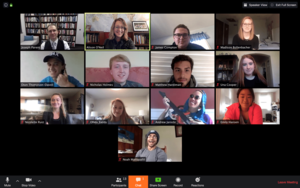 "
"
When Kevin Barry, the senior director of the Notre Dame Learning team, was preparing to leave for his spring break vacation, the spread of COVID-19 had already shut down the university’s Rome Global Gateway program for the semester, and its impact was beginning to be felt across the world. But Barry, like many Notre Dame staff, faculty and students, said he didn’t suspect the virus would reach South Bend in a matter of days, upending the rest of the spring semester.
“I keep telling people, if only we had crystal balls that existed,” he said.
During Notre Dame’s spring break, news about the novel coronavirus unfolded rapidly. By March 11, five days before students were scheduled to return to campus, university officials suspended classes until at least April 13. By March 18, administrators announced that campus would be closed for the rest of the semester. In just a couple of weeks, Barry and his colleagues at the Notre Dame Learning team had to orchestrate a plan to shift all university classes to online platforms. Notre Dame students and faculty had to quickly adjust to a new educational reality, completing the semester’s coursework while scattered across the globe.
Maria McKenna — an associate professor in the Department of African Studies and the Education, Schooling and Society program — is among the hundreds of Notre Dame instructors who have readjusted their coursework, modes of communication and expectations to meet this unprecedented moment. She said the process has been challenging and imperfect.
“When you alter a syllabus as quickly as all of us had to, you're really trying to do the best that you can in a short period of time, knowing that you're probably going to have to go back and change it again,” she said.
Unlike other online classes, which are intentionally designed for online platforms, Barry said most professors are reconfiguring classwork that was intended to be administered face-to-face. For that reason, he said that he and other administrators prefer the term “remote learning” — rather than “online learning” — to indicate the unique challenges of this abrupt transition to virtual instruction.
As the Notre Dame Learning team helped instructors modify their curricula for “remote learning,” Barry said they drew from the model of Notre Dame’s online classes. All of Notre Dame’s summer classes, he said, include some “asynchronous” work, which students can complete on their own time, and some “synchronous interaction,” a scheduled time for the entire class to meet over the video conference platform, Zoom. Barry said he and his team helped instructors design their “synchronous” interaction thoughtfully, while also making some work asynchronous if possible, to mitigate potential technical issues.
As students adjust to the new online environment, Barry and his colleagues on the Notre Dame Learning team have encouraged professors to adopt an attitude of flexibility and empathy. Amidst all the disruption and uncertainty of this moment, McKenna said students are also contending with personal challenges — such as illness, emotional distress and family concerns — that may impede their ability to learn and perform at the same level.
“This is different than just teaching online,” McKenna said. “We’re teaching online because of a global pandemic. And so how do you make sure that our students are being cared for — not just in terms of the content that we're offering them, but in everyday life?”
For some Notre Dame students, remote learning poses significant challenges. Sophomore Tarik Brown serves as the president of Notre Dame’s chapter of Questbridge, an organization that connects high-achieving, low-income students with leading colleges and universities. Through Questbridge, Brown said he’s become well-connected with Notre Dame’s community of first-generation and low-income (FGLI) students. Brown said FGLI students were already disadvantaged in many ways, but the campus closures have magnified that inequity.
When the university announced its campus closures, Brown worked with fellow Questbridge scholar Matthew Bisner to crowdsource a spreadsheet of resources for FGLI students. The spreadsheet’s resources range from temporary housing to free internet services.
Low-income students often “have to work on-campus jobs in order to send money back home to help pay bills and stuff,” Brown said. “What do you do when you can't work your on-campus job anymore and you lose that source of income?”
Not only have many FGLI lost access to campus jobs and resources, Brown said, they also face additional challenges at home. He said some of his friends share their home WiFi with five or six siblings, so their connection is slow, making it difficult to complete their online coursework. But, Brown said, he believes the university has been receptive to feedback from FGLI students, working to make the transition easier by offering resources and flexibility.
McKenna said she’s made equity a high priority during the transition to remote learning, giving students the benefit of the doubt and communicating with them about their concerns and needs. And as she’s reimagined her coursework, she said she’s also thought deeply about how to maintain human connections with her students despite the distance and the shortcomings of virtual communication.
“I think this is true of every college and university across the country that we recognize that content is important, but we recognize that equally as important are the relationships that we have with you all on a day-to-day basis, “McKenna said.
Empathy and connection, she added, are profoundly important during this time of social distancing.
“I think this is a defining moment of our lifetimes,” McKenna said. “And how we respond to one another is as important as the pandemic itself — the science and the medical side of this. There's a human element to this that's really calling us to be our best selves in a way that we've never been called to do before.”
(Photo by Alison O'Neil)